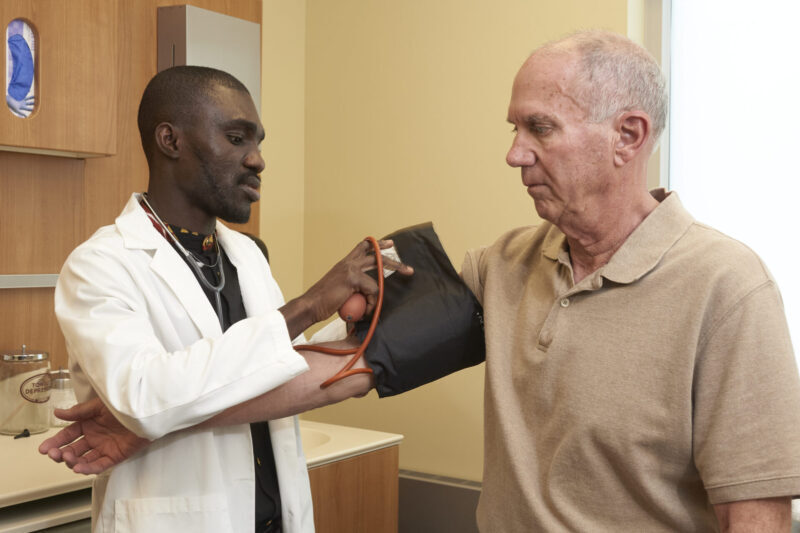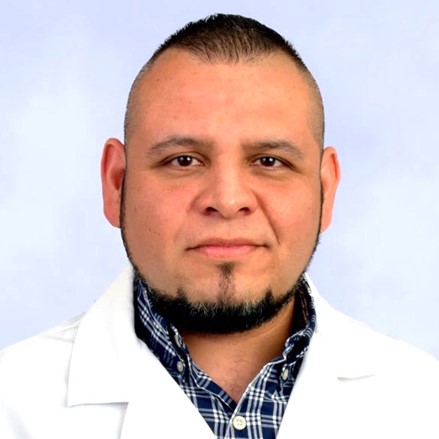Purdue Doctor of Nursing Practice program prepares nurse leaders to deliver highest level of patient care
Written By: Rebecca Hoffa, rhoffa@purdue.edu

As one of the two terminal degrees in the nursing profession, DNP-prepared nurses often work closely with PhD-prepared nursing scientists to make a difference in the patient care landscape and improve outcomes for human health and well-being.(Photo by Christine Petkov)
Rainey Michael always knew she wanted to pursue her Doctor of Nursing Practice (DNP) degree to make a difference in preventative care for vulnerable populations. With her plans to advance her leadership in patient care and shape health policy, Michael’s decision to attend Purdue University’s DNP program, which ranks among the top 10% in the country, was an easy one.
“I felt like it would be a positive place to obtain my DNP,” Michael said. “I felt like I would be supported, and I enjoyed the aspect that they find our clinical placements for us — not a lot of programs do that, so that was one stress that was taken off of our plate that I really appreciated.”

Julian Gallegos(Photo provided)
Julian Gallegos, clinical associate professor and director of the DNP program in the School of Nursing, noted Purdue’s DNP program often stands out for its hybrid nature, requiring students to come to the West Lafayette campus for courses in addition to their outside clinical rotations. For Michael, this structure has proven valuable in helping her learn from others with varied levels of experience and make strong friendships in the program.
“I think having that face-to-face interaction not only helps in supporting the students from the faculty standpoint, but also, the students get to come together with their cohort and get to know each other and support each other in that way,” Gallegos said. “I think that’s what makes us a little bit unique as opposed to the all-online programs that are out there.”
The DNP credential is the highest clinical degree that’s awarded in the nursing field. As one of the two terminal degrees in the nursing profession, DNP-prepared nurses often work closely with PhD-prepared nursing scientists to make a difference in the patient care landscape and improve outcomes for human health and well-being. The DNP program prepares advanced practiced nurses to understand the research landscape and translate scientific findings to patient care.
“It’s a symbiotic relationship with the PhD, so essentially the DNP is the clinician at the bedside, actually interacting with the patient,” Gallegos said. “What they do is they find gaps of care and either find the evidence to support making changes, or they turn around and give it to the researcher. Then, the DNP-prepared nurse is required to translate the research into how this is practical for caring for the patient.”
Housed in the College of Health and Human Sciences, Purdue’s DNP program offers four nurse practitioner concentrations, which include adult gerontology primary care, family practice, pediatric primary care and psychiatrics/mental health. Michael, who entered the program directly after graduating from Indiana University-Purdue University Indianapolis in 2021 with her Bachelor of Science in Nursing, chose to pursue a family practice concentration because of its emphasis on preventative care rather than treating chronic conditions.
“Purdue really focuses on making sure that we treat the patient before problems develop into something serious, making sure we’re proactive in our patient care,” Michael said. “The specialization allows you to work with children just days old all the way to people in their 100s, so there’s a large scale of different types of patients you can treat. You’re always met with something different.”

Rainey Michael(Photo provided)
Beyond its concentrations, the DNP program facilitates a variety of interdisciplinary opportunities within its curriculum for students to advance their leadership. From exploring systems management to effecting change in health policy to making a difference using evidence-based practice across different areas of care, the in-depth curriculum prepares students to understand the process behind evaluating, diagnosing, and treating patients and elevating their leadership as they become advanced practice nurses.
During her time in the program, Michael has valued the emphasis her instructors have placed on helping students tailor their education and clinical opportunities to their passions.
“This fall, I really wanted to focus on diabetes management, so my program director and my preceptor were aware of that, and they really ensured I had opportunities to develop the plan of care and manage those types of patients independently,” Michael said. “Now, having almost completed that clinical, I feel a lot more confident. If you verbalize, ‘This is an area I’m struggling in that I want to become more confident in,’ they ensure that you get those opportunities.”
As Michael prepares to graduate from the program in August 2024, she noted that it is the individuals who make up the program who make the greatest impact on Purdue DNP students and have helped the program become one of the top-ranked DNP programs in the United States.
“I feel like the staff and professors in the Purdue DNP program are always there for you and willing to answer any questions that you have,” Michael said. “You definitely feel supported.”
Discover more from News | College of Health and Human Sciences
Subscribe to get the latest posts sent to your email.